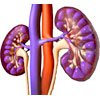Kidney cancer patients have fewer complications if they have only part of their organ removed
Patients with kidney cancer who had their entire organ removed were more likely to have more renal complications and poorer health after surgery, compared to those who had only part of their kidney removed, a study has shown.
Ronald Moore, a professor in the Department of Surgery, a senior scholar funded by Alberta Innovates – Health Solutions, holder of the Mr Lube Chair in Uro-Oncology and a practising surgeon, studied 1,151 kidney cancer cases in Alberta, with his colleagues Scott Klarenbach, an Alberta Innovates – Health Solutions investigator and associate nephrology professor, as well as Branko Braam, an associate nephrology professor and a Heart and Stroke Foundation of Canada new investigator. This is the largest review on the topic of full vs. partial organ removal for kidney cancer patients. Researchers in other countries have looked at this issue, but examined substantially fewer cases.
The researchers with the Faculty of Medicine & Dentistry at the University of Alberta, who were also supported by the Alberta Health Services Northern Alberta Renal Program, reviewed patient outcomes from 2002 to 2007 via a provincial database.
They found that 80 per cent of patients underwent surgery to have their entire kidney removed as a way to treat their kidney cancer.
Furthermore, patients who had their entire kidney removed were more likely to develop chronic kidney disease and kidney failure (requiring treatment with dialysis), both of which are serious, chronic medical disorders. Less than three years post-surgery, the number of patients who had renal complications was 12.5% for those who had their whole kidney removed, compared to 7% or those who only underwent partial kidney removal. This is an important difference in outcomes.
What is troubling, says the team, is that only 20% of kidney cancer patients in Alberta and across North America are undergoing partial kidney removal surgery when they are diagnosed early. That number needs to be much higher – especially in light of these findings which build on previous research.
“It is important for patients and healthcare providers in Alberta and Canada to know this information, so patients can live longer post-surgery and have a better quality of life with fewer health complications,” says Moore. “There could also be overall healthcare cost savings because patients wouldn’t have as many complications afterwards.”
The team also made another interesting finding – that patients with protein in their urine were more likely to experience renal complications: 42% of patients with proteinuria had renal complications post-surgery, compared to just 9% of patients who had no protein in their urine. Their results were recently published in the European Journal of Urology.
Over the last couple decades, patients with kidney cancer have been diagnosed earlier thanks to improved technology. Earlier diagnosis and an ageing population have all contributed to an increasing incidence of kidney cancer.
Those in the research and medical fields have been surprised that patient survival rates haven’t increased despite earlier diagnosis of renal cell carcinoma. That concern led to studies on partial vs. whole-organ removal. The results of this study will help doctors identify kidney cancer patients who are at high risk of developing subsequent chronic kidney disease and kidney failure. Once that has been determined, then physicians and patients can work together to choose the best surgical treatment for the patient.
Kerry Jewell, 29, found out she had kidney cancer last June. The tumour, which was two-cm long and at Stage 1, was discovered “by accident” when she had an abdominal scan for gallstones. She had a partial kidney removal in late February. She said she researched her options and was happy she had only part of her one kidney removed.
“The surgery is harder to recover from, but I’m 29 and I have a long life ahead of me. I think it’s better to have almost two kidneys as opposed to just one. I think it’s easier for your body to function with more than just one kidney.”
Kidney Cancer Canada was pleased to hear about the recent research results from the Faculty of Medicine & Dentistry.
“We commend the researchers at the University of Alberta for their commitment to kidney cancer. The more the disease is studied, the better treatment becomes for patients,” says Joan Basiuk, a registered nurse and director, medical relations, for Kidney Cancer Canada.
“This research underscores the fact that there is no one-size-fits-all approach to treating kidney cancer, and future kidney function must be a part of the overall treatment plan that the physician and patient consider together.”
(Source: University of Alberta: European Journal of Urology)
More information
 | For more information on kidney cancer, including types and treatment, see Kidney Cancer . |
Dates
Tags
Created by:

 Login
Login














